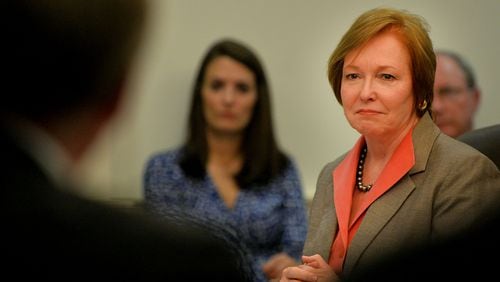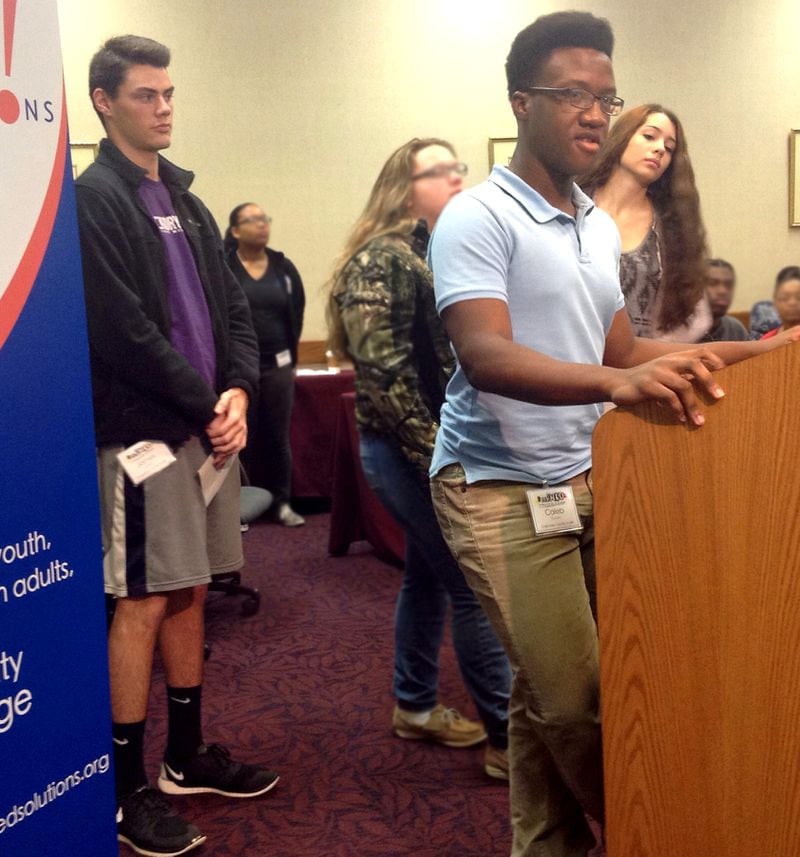When Georgia Department of Public Health Commissioner Brenda Fitzgerald joined Gov. Nathan Deal in 2012 to launch his program against childhood obesity, the announcement pledged a combined focus of “exercise and better nutritional options.”
But two years later, the blog of Fitzgerald’s department described Georgia SHAPE more narrowly, as “the Governor’s initiative to increase physical activity in Georgia schools.”
In the meantime, the program got $1 million from Coca-Cola.
The gift became news fodder last week when Fitzgerald was made director of the U.S. Centers for Disease Control and Prevention. State public health officials say the Coca-Cola gift had no influence on their focus, though activists charge that the soda industry uses its power to divert the focus of obesity concerns away from soda consumption and toward exercise.
Nancy Nydam, a spokeswoman for the department, said the 2014 blog item was a one-time fluke and Georgia SHAPE was “about creating healthy lifestyle habits that include nutritious foods and moving more.”
Now, a new look at some of the program’s work under Fitzgerald raises questions about whether it shied away from messages that would drive home the impact of soda on obesity.
In an era when some public health activists push for extra taxes on sodas, bans, or for turn-off ads showing a 20-ounce cola as a glass of 22 packets of sugar, Georgia SHAPE’s message is far different.
The agency’s program director for Georgia SHAPE says there was no push to ignore soda, however, and some health activists say there’s nothing abnormal about messages that focus on the positive.
Indeed, if Georgia SHAPE reflects Fitzgerald’s approach, it would put her squarely in line with many other Georgia leaders who oversee children’s health.
Georgia grown
Fitzgerald, in an emailed statement from the CDC, noted that the Georgia program was Deal’s initiative. “We worked hard to ensure our program was robust and included all evidence-based strategies for reducing obesity,” she said.
In a 2013 video about being the state’s first commissioner of public health, she said the state’s greatest challenge was obesity and that the DPH’s advantage was that it had the data that people could use to construct solutions.
But an important research document by DPH used by Georgia SHAPE, a 72-page survey of Georgia youth risk behaviors, does not mention soda or soft drinks. Its research on kids’ consumption of sugary drinks used examples such as lemonade, sweet tea and Snapple.
Rodney Lyn, an associate professor at Georgia State University's School of Public Health, said since it dealt with sugar-sweetened beverages he wasn't too concerned by the omission.
“There has been emphasis placed on soda by some,” Lyn said. “I’m not particularly in the camp of ‘Let’s blame Coke and Pepsi,’ just to be honest with you.”
Many Georgia officials would agree.
Georgia SHAPE had its genesis long before Fitzgerald ever stepped into the commissioner's office. State legislators talked about an initiative for years, and they passed a law in 2009, the Georgia SHAPE Act, requiring fitness evaluations.
The law focused on fitness and not nutrition for a reason, Lyn said.
“When you start to think about moving legislation, and who are our opponents, the conversation was, ‘Who could be against physical activitiy?’ ” he said.
However, “when you think about nutrition, there are stakeholders that have a vested interest there. Why fight that fight?”
When asked who the stakeholders were, Lyn demurred.
“I’d just be speculating. Certainly there’s a strong beverage industry here,” he said. “I guess I’ll leave it at that.”
The global giant Coca-Cola has been headquartered in Atlanta since its birth in 1886.
Kids and choice
The Georgia Department of Education is also no soda warrior. When the federal government restricted the sale of sugary drinks at school fundraisers, it allowed states to apply for exemptions. The department went for broke.
It said a school can have 30 unhealthy fundraisers, each selling sugary treats like soda, candy and baked goods. Furthermore, each could last up to three days, as long as the sales are well outside cafeteria meal times. “It equates to half of the school year,” said Mike Stubbs, who works with about 220 Georgia schools for the Alliance for a Healthier Generation. “That was a tough pill to swallow.”
As Fitzgerald left the DPH, it was developing an incentive program to encourage schools to have healthier fundraisers. They would get more recognition as they offered fewer unhealthy drinks and foods. “Dr. F was just happy as can be with that,” said Emily Anne Vall, the DPH’s project manager for Georgia SHAPE.
ORIGINAL CONTENT: Read the 2013 press release for the Coca-Cola donation here
IN COKE'S WORDS: Company says its focus has changed
Experts say that offering choices has its limits, particularly when dealing with kids. Part of the problem is sugar’s addictive quality. The other part is schools’ addiction to the money that soda can bring in at fundraisers when schools get a cut of the sales.
But focusing on personal choice rather than mandates and government intervention is popular among Georgia conservatives. Fitzgerald once served as chairwoman of the Georgia Public Policy Foundation, an influential organization that advocates against regulation and for private partnerships and personal choice.
Georgia’s former governor, Sonny Perdue, is now the U.S. secretary of agriculture. Speaking recently to a national association of school lunch officials, he extolled the “love” he could still feel from the lunchroom ladies who served him cinnamon rolls in high school in Warner Robins.
Asked whether government should discourage consumption of high-fructose corn syrup, he responded, “I don’t think government has a role to be a nanny state of telling parents what their kids should eat.”
Private partnerships
Some activists say the state shouldn’t have taken Coke’s money for an obesity program.
“The way these relationships work is these companies buy something with that investment,” said Kelly Brownell, the dean of the Sanford School of Public Policy at Duke University. “In some cases the companies don’t have to ask for anything in particular because they’re buying silence.”
The Center for Science in the Public Interest has published a report called “Selfish Giving.” CSPI’s director of health promotion policy, Jim O’Hara, said it shows soda companies have used grants “to buy friends and silence potential critics.”
Coke points out its long history supporting Atlanta and Georgia initiatives and said it recognizes it has a role to play in addressing obesity.
Vall said she had never felt any influence, either from Coke or from Fitzgerald, to focus away from soda. She said Georgia SHAPE in 2013 assembled a council to guide it, and it decided to add emphasis on nutrition. She and Nydam detailed the strides the program has made in supporting water and milk as drinks for kids, and breastfeeding for infants.
Fitzgerald defended the Coke money.
“I think everyone can agree government can’t and should not do everything alone,” she said. “Public-private partnerships can be powerful tools that help extend government’s ability to save lives, solve problems and speed innovation.”
She added, “As commissioner and now as director of the Centers for Disease Control and Prevention, I am committed to both scientific knowledge and innovative partnerships that advance the agency’s lifesaving mission.”
Georgia SHAPE
Georgia SHAPE takes its name from the 2009 Georgia Student Health And Physical Education Law, which started out simply mandating fitness evaluations. In 2012, Gov. Nathan Deal launched Georgia SHAPE as his program to address childhood obesity, to focus both on exercise and nutritional options. The program calls itself “statewide, multi-agency and multi-dimensional.”
Staffers at the state Department of Public Health administer the program. They define SHAPE as all the efforts in the state that help fight childhood obesity age zero to age 18, encompassing some 120 “partners.” Those partners may be nonprofits that implement programs, donors or other organizations such as the U.S. Centers for Disease Control and Prevention.
By the expansive definition of the program, much of the work done by Georgia SHAPE is simply reported to the DPH by approved partners, not actively overseen by the DPH. But the DPH administers grants to Georgia schools of up to $5,000 to promote fitness and nutrition under SHAPE. It also does research and organizational coordination, and it has convened meetings and health summits.
GOVERNMENT AND POLITICAL NEWS
If it happens in Washington or under the Gold Dome — or somewhere else — and it affects Georgians, The Atlanta Journal-Constitution has somebody there to tell you what it means. Follow our coverage at http://www.myAJC.com/politics.









